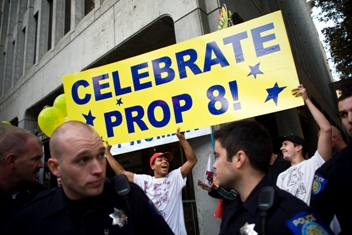
A Federal Court Judge has refused a petition to withhold the names of donors to the Yes on 8 campaign. The supporters of the gay marriage ban complained of "harassment" stemming from the release of donor identities in accordance with the Political Reform Act. But their real worry, as became clear during the hearing, was the boycotting of donor businesses - a constitutionally protected form of speech.
Turns out the Yes on 8 folks are very worried about the proposal to identify and campaign against businesses owned or controlled by their supporters.
And when the other side gets worried, we should start paying attention.
Boycotts are familiar territory for the anti-gay movement. Look no farther than the American Family Association's boycott of Pepsi Co for their donation to the Human Rights Campaign. But we have been slow to utilize their tactics.
The thing about boycotts is, they're complicated. Come up with a list that's too long and no one remembers what they are not supposed to buy. Choose to pick on employees of large corporations and support might dwindle. You have to find a big fish that has an owner or CEO who made a donation and focus on it.
So far, boycott efforts have been scattered. The El Coyote restaurant in Los Angeles reportedly saw very little drop in business after its owner donated to the Yes on 8 campaign. The CEO of Cinemark gave $10,000 to Yes on 8, but calls to avoid its outlets have not been consistent or well publicized.
This is a disappointment because boycotts just might be the most effective strategy for the equal rights movement. Between those who identify as LGBTQ and those who support them, the community holds a lot of buying power. Hollywood, for one, has the opportunity to make an impact on Cinemark. And the residents of L.A., an urban center with a considerable gay population, could make El Coyote actually feel a drop in business.
We need a national organization to choose one or two targets, explain the reasons for those choices and spearhead the publicity campaign.
If we make one business falter, especially in this economy, the movement as a whole will gain more credibility and momentum. In this period of waiting for change from the Federal government and battling uphill against State governments, the gay community could really use a win.